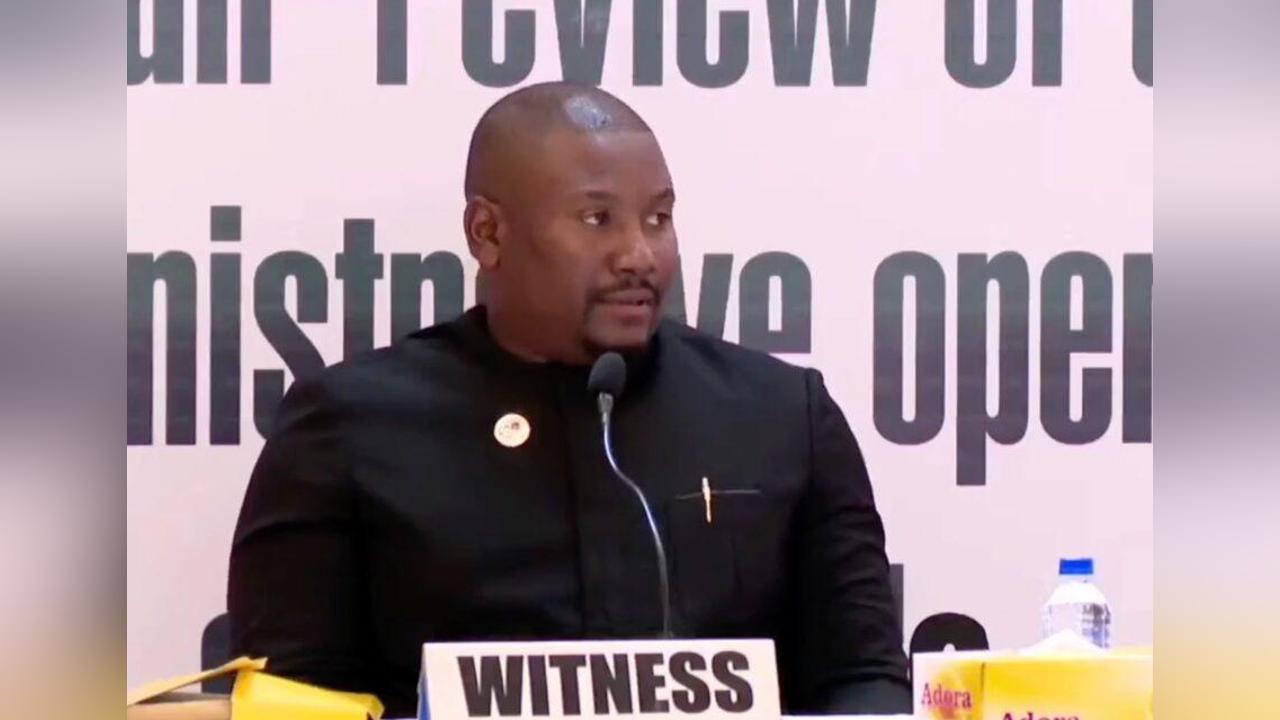Africa-Press – Gambia. The Mayor of Kanifing Municipal Council (KMC), Talib Ahmed Bensouda, on Thursday defended the handling of the council’s €3 million project account before the Local Government Commission of Inquiry, amid questions about the legality of certain signatory arrangements.
Mayor Bensouda faced scrutiny regarding the procedures for opening council bank accounts and the authorization of account signatories. He explained that, under normal circumstances, KMC accounts require signatures from both the Chief Executive Officer (CEO) and the Director of Finance, with approvals for new accounts typically sought from the full council.
Counsel Gomez, however, challenged the mayor on irregularities observed in the management of the Dalasi account linked to the Kanifing Environmental Transformation Programme (KEPT). “The Dalasi account In managing the €3 million, we see there were private individuals that were not council employees as signatories,” Gomez said.
Counsel presented Mayor Bensouda with a correspondence dated 11 May 2022, in which the Deputy CEO and Deputy Director of Finance wrote to ECO Bank requesting a change in the signature mandate of the Kanifing Municipal Council’s Kanifing Environmental Transformation Programme (KEPT) project account.
When asked where the two officials derived their authority for such a request, the mayor responded that it must have come from either the Finance Committee or the full Council, though he could not recall precisely.
Counsel Gomez then questioned whether the officials, in their acting capacities, had the authority to alter the account signatories.
In reply, Mayor Bensouda maintained that they did, noting that the Council had already empowered them to manage the accounts.
“The project was already adopted by the council with the knowledge that the project office will execute the project. So at their level operationally, they were changing authority levels because of time issues,” the mayor explained.
Counsel Gomez disagreed, citing Section 13, Subsection 3 of the Local Government Finance and Audit Act, 2004, which stipulates that only the CEO and the Director of Finance—or the Director of Administration in their absence—may serve as signatories to council accounts.
Counsel Gomez added that there is nowhere in the provision that provides for any other apart from the above-mentioned, “That is why I ask to know what council relied on in authorizing individuals outside this bracket.”
In reply, Mayor Bensouda explained that because both the CEO and the Director of Finance were unavailable, their deputies acted in their place.
However, Counsel Gomez maintained that he wanted the mayor to clarify under what law deputies are permitted to sign cheques in the absence of their superiors.
Mayor Bensouda stated,“So I think laws are rigid, but there is the grey area of the law, and this is one of those grey areas.”
Counsel Gomez suggested that, in practice, deputies should assume responsibilities in the absence of their seniors but noted that the law does not explicitly provide for this.
The mayor, however, maintained that deputies are specifically appointed to act on behalf of their seniors when they are absent.
Regarding the issue of additional signatories to the account, Mayor Bensouda explained that it concerns a project account. The structure and arrangements require the council to maintain a project office. He added that the project director and project manager serve as the implementers, and that the matter was thoroughly discussed at the council. Ultimately, the parties agreed that the account would be co-managed to ensure proper oversight and accountability.
“So the source of funding is an outside body so they can determine how the funding should be implemented. So it is the decision of the donor agent,” he said.
He further emphasized the practical purpose of these arrangements, stating, “So if the law is as rigid as you are saying, I believe that is why we are here. I believe it is why there is the issue of courts and contexts, and the context is that the greater good is that the projects are implemented.”
“So when the donor wants to be signatory to the account and the law says otherwise, which one should supersede?” Counsel Gomez asked.
The mayor responded that in this context, the donor’s directives take precedence. “Like I said, there are grey areas of the law; that is why context is very important.”
Counsel Gomez noted that while legal interpretations may vary, the text of the law remains binding.
When the mayor asked whether the counsel was proposing that the funds be returned to the donors, the counsel confirmed this.
“I think it is the law that needs to be evolved and amended rather than return vital money that can be used to develop,” the mayor said.
He emphasized that this, in his view, is a key reason they are appearing before the commission, noting that The Gambia operates largely as a donor-driven economy. “The central government is more than the local government, but definitely it is up to the people giving the money in most parts who dictate,” he said.
For More News And Analysis About Gambia Follow Africa-Press






